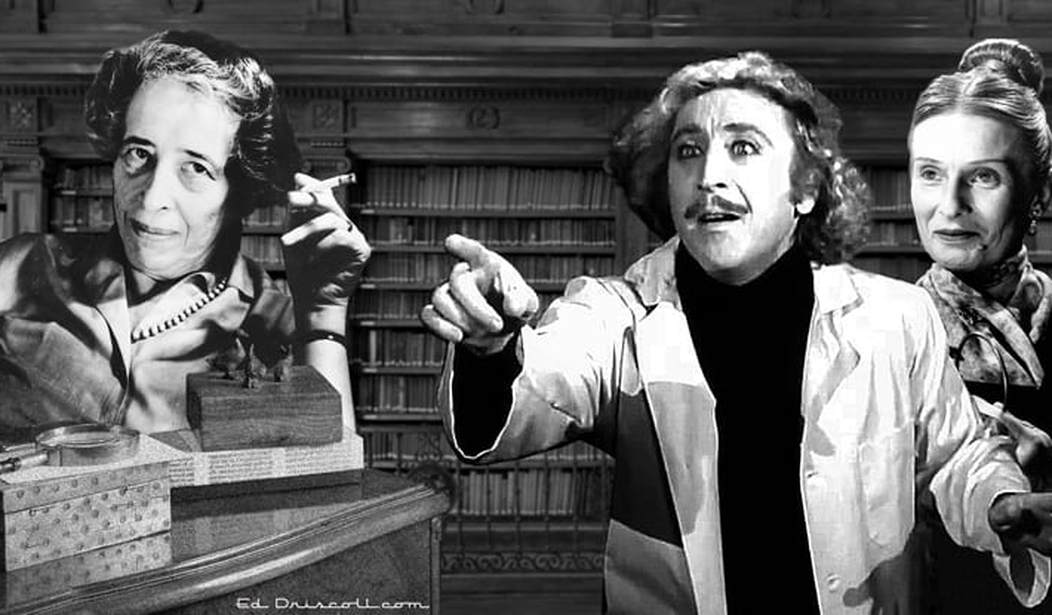The late Gene Wilder not only played comedy, but wrote it. “Young Frankenstein,” for my money Mel Brook’s best film, was Wilder’s idea, and the script was a joint effort by the two comic geniuses. Cloris Leachman’s creepy cameo as Frau Blücher, the housekeeper and apparent mistress of the late monster-maker, qualifies as one of the funniest moments on the American screen. Horses rear in terror at the mention of her name. She gazes at her dead lover’s grandson with a perverse lust that would grow fungus on a billiard ball. And she was in the film for a reason.
“Frau Blücher” was the married name of the renegade Jewish philosopher Hannah Arendt, the erstwhile mistress of the philosopher and sometime Nazi Party member Martin Heidegger. The most influential Existentialist of the 20th century, Heidegger took over the University of Freiburg the same month that Hitler seized power in 1933, and threw in his lot with the Nazis–after looting Arendt’s dissertation on St. Augustine for material in his magnum opus Being and Time. The married Heidegger spent the 1920s sleeping with his Jewish graduate student and borrowing her research, before joining the Nazi Party himself. Arendt was obsessed with Heidegger. After World War II she appeared in public with Heidegger and aided his rehabilitation, even though Heidegger refused to renounce his support for Hitler.
Arendt famously covered the Eichmann trial in Jerusalem for The New Yorker, coining the phrase “the banality of evil” to characterize the Nazi mass-murderer, who she thought ordinary and too dull to form a truly evil intent. By equating evil with banality, Arendt argued in effect that true genius (such as Heidegger’s) couldn’t really be evil. Her writings on Eichmann provoked outrage in the Jewish world. Privately, Arendt expressed contempt bordering on racism for the Israelis:
In a letter to the noted German philosopher Karl Jaspers she stated that Hausner was “a typical Galician Jew… constantly making mistakes. Probably one of those people who doesn’t know any language.”[16] Cesarani claims that some of her opinions of Jews of Middle Eastern origin verged on racism as she described the Israeli crowds in her letter to Karl Jaspers: “My first impression: On top, the judges, the best of German Jewry. Below them, the prosecuting attorneys, Galicians, but still Europeans. Everything is organized by a police force that gives me the creeps, speaks only Hebrew, and looks Arabic .Some downright brutal types among them. They would obey any order. And outside the doors, the Oriental mob, as if one were in Istanbul or some other half-Asiatic country. In addition, and very visible in Jerusalem, the peies (sidelocks) and caftan Jews, who make life impossible for all reasonable people here.”
As Martin Glickman observed in his book Stolen Words, “Although she could rarely went by her married name, the fact that she could have been called ‘Frau Bluecher’ sadly seems to have been lost on Mel Brooks fans everywhere.” Like Cloris Leachman’s character, her obsession with Heidegger–another maker of monsters–remained undiminished by time and crime.
I do not have direct evidence that Wilder modeled the character on Arendt, but the coincidences seem too close to believe in accidents. In hell, Jew-haters are tormented by Jewish comedians. My understanding of the World to Come is hazy, but I hope that Gene Wilder’s talents continue to afflict the departed souls of the enemies of his people.










Join the conversation as a VIP Member